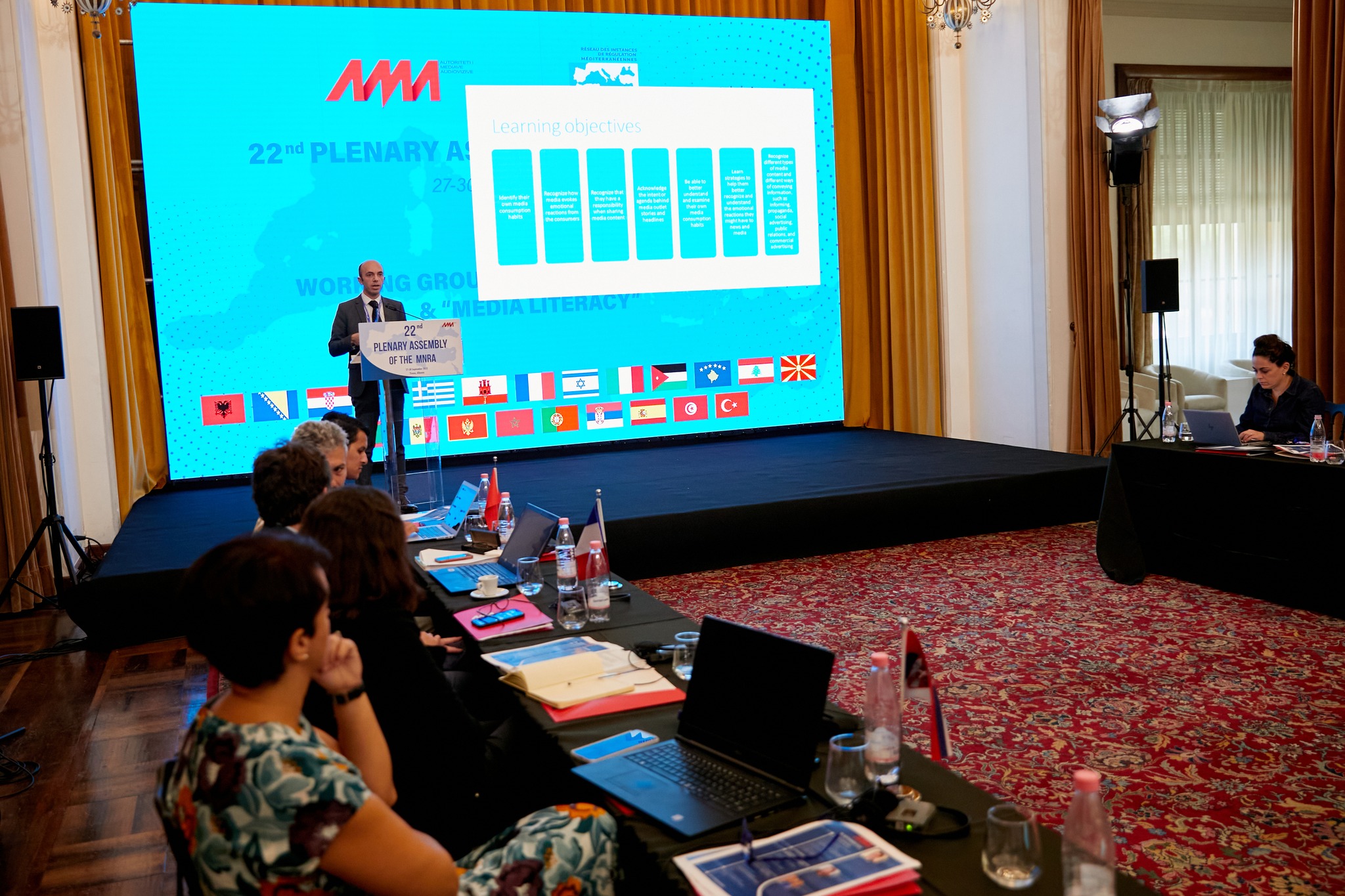IMC participated in the 22nd Plenary Assembly of the Mediterranean Network of Regulatory Authorities (MNRA)

02 October 2023
IMC participated in the 22nd meeting of the Plenary Assembly of the Mediterranean Network of Regulatory Authorities (MNRA). The conference took place in Tirana from September 28-29, 2023. The assembly addressed important topics, such as the challenges faced by the media environment, but also the regulatory authorities themselves, the current media market, new communication channels created by technological development and the need to fix them.
Present at this event were the heads of the regulatory bodies of the MNRA member countries, the president of ERGA, Giacomo Lasorella, the representative of UNESCO, Ana Cristina Ruelas, the representative of the Facebook platform, Marisa Jimenez Martin, the representative of Tik- Tok, Lukasz Gabler, etc. On the first day of the Assembly, the head of the Croatian regulatory body (AEM), Josip Popovac, handed over the next presidency of the MNRA to the president of the AMA, Armela Krasniqi.
The European Media Freedom Act (EMFA), which is expected to be adopted soon by the Council of Europe, was one of the interesting topics of this Assembly. EMFA is a very useful new instrument of the European Union for the protection of media pluralism and independence. Despite the fact that this Act has not yet entered into force, it focuses on the independence of the media, but also on the transparency of media ownership and the distribution of public advertisements. It defines measures for the protection of the independence of editors and the disclosure of conflicts of interest.
The head of The European Regulators Group for Audiovisual Media Services (ERGA), Giacomo Lasorella has presented the effects of technology on the media market, the need for regulatory authorities to adapt to these changes, as well as the importance of adopting the European Act on Media Freedom.
The two-day assembly has developed works in several panels with presentations and discussions by the participants.
In the first panel on the topic, European Media Freedom Act (EMFA), quality media and fact-checking, Frederic Bokobza of ARCOM France, Marisa Jimenez Martin of the Facebook platform, Anita Malenoca, member of the Council of the Croatian regulatory body, participated. while the president of AMA, Armela Krasniqi, as the moderator of this panel.
Another topic that was discussed in the second panel of the 22nd MNRA Assembly was the need to regulate the operation of Video Distribution Platforms. In this panel moderated by Joanna Spiteri (Malta), Pedro Ruivo (Portugal), Charis Tsigou (Greece) and Lukasz Gabler (Tik Tok) discussed. Video sharing platforms, another innovation of the ecosystem created by technology, where the user also becomes the content producer, are one of the current issues of discussion about the need to regulate them. Currently, media regulatory authorities are adapting to the tasks and responsibilities they face, therefore they are developing new approaches for the legal regulation of VSPs.
On the second day of the Assembly, the experience of UNESCO in the protection of media freedom, as well as freedom of expression, safety of journalists, gender and media, as well as public education, was discussed. Topics of the principles of media freedom versus broadcasts of harmful audiovisual content, media education and gender representation in the media environment.
The work has started with the panel consisting of Ana Cristina Ruelas, representative of UNESCO, Monica Duran Ruiz, Spain, Frederic Bokobza, France, and Josip Popovac of the Croatian regulatory body.
Ms. Ana Cristina Ruelas, Senior Program Specialist at UNESCO, presented the UNESCO Guidelines on the protection and promotion of freedom of expression, access to information and safety of journalists. "We cannot leave it to private companies to solve this existential issue by themselves, said Ruelas. "Our aim as UNESCO is to collectively define the principles and processes of content moderation, respecting human rights, and in particular freedom of expression". The UNESCO Guidelines are designed to inform the processes of managing audiovisual content on digital platforms, as well as the governance processes already in place in other areas that have an impact on the exercise of freedom of expression and access. in information, in accordance with the changes brought about by the digital environment. The media can also benefit from these Guidelines in their ongoing effort to accurately report programming.
Mr. Josip Popovac and Mrs. Monica Duran Ruiz discussed how the UNESCO Guidelines can be used to build wider communication and cooperation networks among MNRA regulators and shared their experience in putting the Guidelines into practice during their activity as regulators. While the two speakers of the working groups, Mrs. Joanna Spiteri and Mrs. Monica Duran Ruiz, shared very interesting presentations on the level of presence and representation of women in daily news shows, as well as sports programs. Their research aimed to establish whether gender is a conditioning factor in terms of representation in the media, in relation to social groups and diversity. The discussions concluded that increasing the level of visibility of women in the media is essential to build and publicize public models that contribute to closing the gender gap.
Mr. Jeton Mehmeti, Chairman of the IMC, presented a detailed aspect of the activity of the IMC regulator in promoting media education of the public, in the local context.
While prof. Georges Pleios, expert of the Greek regulatory authority, concluded the discussions of the second day of the assembly, with a presentation on the audiovisual contents that can be considered prohibited, under the magnifying glass of the latest global and technological developments.